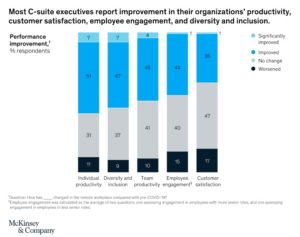How can we ensure productivity in hybrid working?
I have had some interesting conversations with clients recently about hybrid working. As companies in the UK and US in particular are facing an imminent return to work in some kind of a hybrid pattern, many are looking at formal trials to evaluate the impact of hybrid on productivity and engagement.
Some have jumped straight to a hybrid future on the assumption it will work and at the request of their employees. At the other end of the scale some organisations and individual departments (usually those with a traditional command and control management style) are experiencing what I call “the Empire Strikes Back” as, despite the evidence of the last 12 months, some managers remain distrustful of giving their people flexibility (or more likely are concerned about themselves giving up their control).
A common question at the moment is, how can we demonstrate the impact of hybrid working on productivity?
It’s a fair question and if you have productivity measures in place already you should be able to evaluate this fairly easily. However, most companies do not have a granular measure of productivity.
It’s a bit like when we run training programmes, clients often ask, how will you measure the impact of the training programme on leadership or matrix management? I always ask, how do you measure their productivity now? I am always keen to get measures in place because when we do so we see very significant increases.
If you want to measure a change you need a base. However, I have very rarely had a client come back in 30 years with a pre-existing baseline measure of leadership productivity.
Because engagement tends to rely on self-reported measures there is more data around on this and the data shows that many organisations have experienced an improvement in engagement during the pandemic period.
Data from before COVID-19 show the people who worked a hybrid working pattern with one or two days in the week in the office were the most engaged of all employees. People really like flexibility.
Studies of remote working in the past have consistently shown an increase in productivity. An excellent recent McKinsey study of hybrid working asked 100 CEOs to report their findings on productivity during the period.

But back to the productivity question. Despite the positive evidence of the last 12 months, why is this a concern now? If it was so important what were our processes for tracking this in the past? There is some understandable uncertainty about such a large change and there are sure to be some wrong turns and unintended consequences. However, this sudden focus on productivity may also be a sign of resistance from managers wanting to re-establish control.
If you already tracked productivity before the pandemic you will have a goldmine of information about productivity when working largely in the office, completely remotely and in a hybrid pattern, I’d love to hear what you are finding.
How will you measure productivity during the move to hybrid working, do you have a “before measure” in place to compare it with?

Explore our training programs to see how we can help.
Agile & Digital Training Matrix Management Training People and purpose Training Virtual Teams TrainingEducate yourself further with a few more or our online insights:
30 years of experience learning with a range of world class clients
We work with a wide range of clients from global multinationals to recent start-ups. Our audiences span all levels, from CEOs to operational teams around the world. Our tools and programs have been developed for diverse and demanding audiences.

Tailored training or off the shelf modules for your people development needs
We are deep content experts in remote, virtual and hybrid working, matrix management and agile & digital leadership. We are highly flexible in how we deliver our content and ideas. We can tailor content closely to your specific needs or deliver off the shelf bite sized modules based on our existing IP and 30 years of training experience.
For more about how we deliver our keynotes, workshops, live web seminars and online learning.